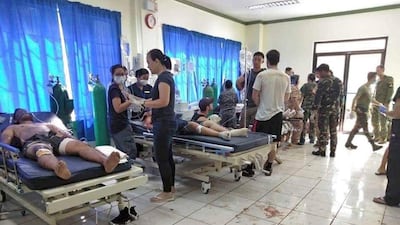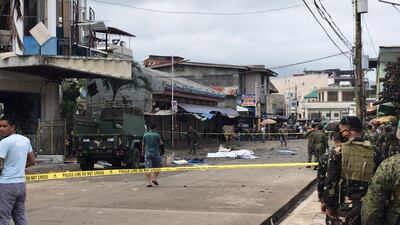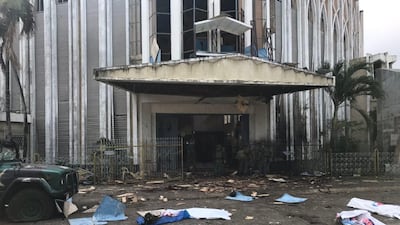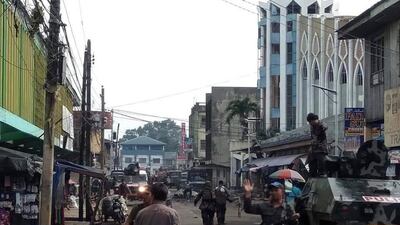Two bombs exploded at a Roman Catholic cathedral on a southern Philippine island where Muslim militants are active, killing at least 20 people and wounding 111 others during a Sunday Mass, officials said.
ISIS has claimed responsibility for the double bomb attack, according to the SITE Intelligence Group which monitors jihadist activities.
ISIS issued a formal communique claiming two suicide bombers had detonated explosive belts inside the church and its car park on Jolo- a stronghold of Islamist militants in the Catholic-majority nation.
Photos on social media showed debris and bodies lying on a busy street outside the Cathedral of Our Lady of Mount Carmel, which has been hit by bombs in the past. Troops in armoured carriers sealed off the main road leading to the church while vehicles were transporting the dead and wounded to the hospital. Some casualties were flown to nearby Zamboanga city.
Police said the fatalities included 15 civilians and five troops. Among the wounded were 17 troops, two police, two coast guard and 90 civilians.
Jolo island has long been troubled by the presence of small but brutal group of Abu Sayyaf militants, who are blacklisted by the United States and the Philippines as a terrorist organisation because of years of bombings, kidnappings and beheadings.
It came nearly a week after minority Muslims in the predominantly Roman Catholic nation endorsed a new autonomous region in the southern Philippines in hopes of ending nearly five decades of a separatist rebellion that has left 150,000 people dead. Although most of the Muslim areas approved the autonomy deal, voters in Sulu province, where Jolo is located, rejected it. The province is home to a rival rebel faction that is opposed to the deal as well as smaller militant cells that not part of any peace process.
Western governments have welcomed the autonomy pact. They worry that small numbers of ISIS-linked militants from the Middle East and South-East Asia could forge an alliance with Filipino insurgents and turn the south into a breeding ground for extremists.
"I have directed our troops to heighten their alert level, secure all places of worships and public places at once, and initiate pro-active security measures to thwart hostile plans," said Defence Secretary Delfin Lorenzana in a statement.
"We will pursue to the ends of the earth the ruthless perpetrators behind this dastardly crime until every killer is brought to justice and put behind bars. The law will give them no mercy," the office of President Rodrigo Duterte said in Manila.
Security officials were looking "at different threat groups and they still can't say if this has something to do with the just concluded plebiscite," Oscar Albayalde, the national police chief, told ABS-CBN TV network.
Aside from Abu Sayyaf, other militant groups in Sulu include a small band of young extremists affiliated with ISIS, which has also carried out assaults, including ransom kidnappings and beheadings.
Abu Sayyaf militants are still holding at least five hostages – a Dutch national, two Malaysians, an Indonesian and a Filipino – in their jungle bases mostly near Sulu's Patikul town, not far from Jolo.
Government forces have pressed on sporadic offensives to crush the militants, including those in Jolo, a poverty-wracked island of more than 700,000 people. A few thousand Catholics live mostly in the capital of Jolo.
There has been speculation that the bombings may be a diversionary move by Muslim militants after troops recently carried out an offensive that killed a number of ISIS-linked extremists in an encampment in the hinterlands of Lanao del Sur province, also in the south.
The area is near Marawi, a Muslim city that was besieged for five months by hundreds of ISIS-aligned militants, including foreign fighters, in 2017. Troops quelled the insurrection, which left more 1,100 dead, mostly militants, and the heartland of the mosque-studded city in ruins.
President Duterte declared martial law in the entire southern third of the country to deal with the Marawi siege, his worst security crisis. Martial law has been extended to allow troops to finish off radical Muslim groups and other insurgents but bombings and other attacks have continued.





